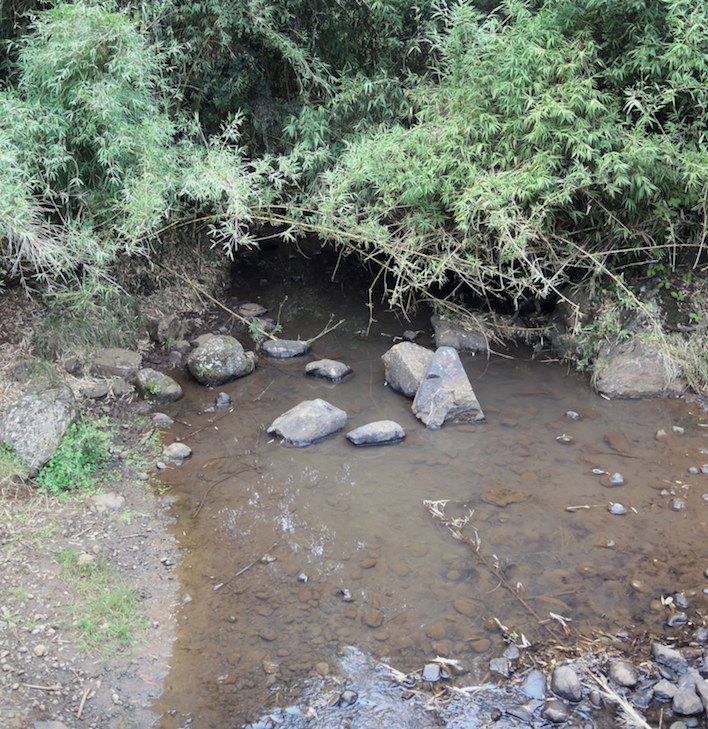
A pine plantation moving into native forest near a Mapuche community. Credit: Photo Langelle
REPORTING FROM CHILE: For people living in the US, the battle at Standing Rock popularized a new term for those taking action to defend the land: Water protectors. Led by Indigenous women, land defenders fighting to stop the Dakota Access pipeline described themselves publicly not as protesters or activists, but as people working to protect the source of life itself.
Here in Mapu–the ancestral land of the Mapuche in south-central Chile, struggle to defend the land and communities from destructive industrial projects are similarly revolving around defense of the water. And for the growing number of rural and Indigenous communities who are seeing their access to water disappear, it’s an existential question of whether they can continue to live on the land of their ancestors. In our travels in the regions of Bío Bío and Araucanía, one after another person testified that once-reliable streams and rivers are drying up, the water table is falling, and communities are forced to truck in water in order to meet their basic needs.
Monoculture tree plantations are the primary culprit for the disappearance of the water, with climate change accelerating the problem. In Chile, tree plantations are known as “green soldiers” due to the fact that they stand in straight lines and advance steadily forward destroying everything in their path. Pine and eucalyptus are planted wherever its physically possible to harvest – ranging from steep slopes on the sides of mountains, all the way down to directly next to streams and rivers themselves. The hills act as sponges, storing the rain in the winter and distributing it through the hot summer. But the plantations steal this water–mining it to produce rapid biomass growth, which is then harvested, processed, and shipped overseas to produce banal consumer goods like cheap diapers for babies in China. It’s part of why the movements in Mapuche territory refer to themselves as in resistance to “extractavismo”, or the extractive model.

Declining water levels in a stream in Mapuche territory. Credit: Photo Langelle
The companies which own and operate the plantations and cellulose plants – the two largest being Arauco and CMPC-Mininco – are hardly concerned about sucking the countryside dry. In fact, it’s entirely in their interest to undermine the life support systems of the rural communities and force people to migrate to the cities to find work, opening the land for further expansion of the monocultures. According to one local organizer, over half of the Mapuche population is now living and working in cities like Temuco or Santiago, based in part on this dynamic. The water question has become a key pivot around which revolves questions of passing on cultural traditions to younger generations, and the relationship of the people (“Che”) to the land (“Mapu”).
There’s another sinister story which has emerged through our delegation’s conversations with rural community members and local organizers. Thanks to climate change and the fragility of monoculture ecosystems, the past few years have seen record infestations of parasitic insects in the plantations – rising to the level of an emergency for the plantations industry. Since investments in plantations require years of waiting before generating a return, it’s a big deal for companies like Arauco and CMPC-Mininco if their investments are dying only halfway through their growth cycle and have to be replaced early. Adding to the crisis is the fact that – according to the locals – the plantations industry lacks insurance that can cover damage due to insect infestations.
But they do have fire insurance.
Every community that we spoke with expressed their belief that the primary cause of 2017’s record plantation fires, which killed 11 people and destroyed thousands of homes, was the companies themselves, burning their own plantations to collect insurance on a failing insect-ridden crop. Within the simple logic of capitalism, it’s an entirely rational move. But for human and non-human life, it’s a devastating act that has resulted in misery for thousands of people in different parts of the country. While our delegation hasn’t done the careful investigation to prove the validity of these claims, it seems entirely possible in a country where the democratically elected government was overthrown, and the Pinochet dictatorship installed in the name of a ruthless experiment in neoliberal economics led by Milton Friedman and the Chicago Boys.
On Saturday, we had the opportunity to sit in on a community assembly in a Mapuche community in the hills outside of Villarica, focused on the water problem and how to stop the further expansion of plantations. Person after person rose to share their experiences and perspectives, and to discuss, with the input of an attorney from a local human rights network, what strategies and avenues would be most effective in enabling the community to recover its water rights and expel the steadily encroaching plantations from their region. As one young woman pointed out, while outside help was important, ultimately it’s up to the community itself to take action to address it’s own issues.
Afterwards, community members took us on a tour of their territory – beautiful rolling hills with patches of fat blackberries, and arching trees covered in copigue flower vines. It was jarring to arrive at the pine plantation, separated from native forest by a barbed-wire fence. Despite the desolate landscape on the far side of the fence, this community seemed to be finding a source of hope in organizing together to defend their way of life.
